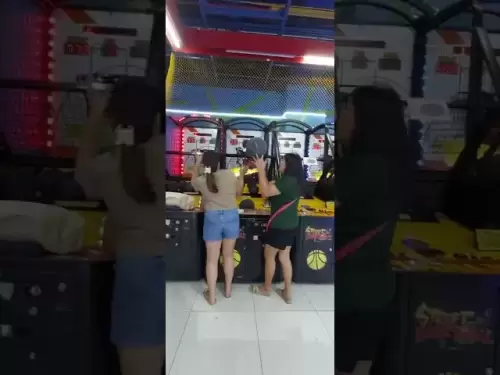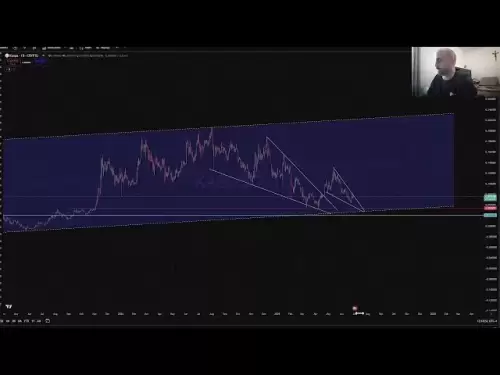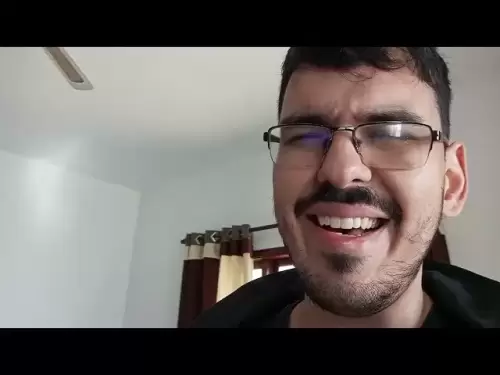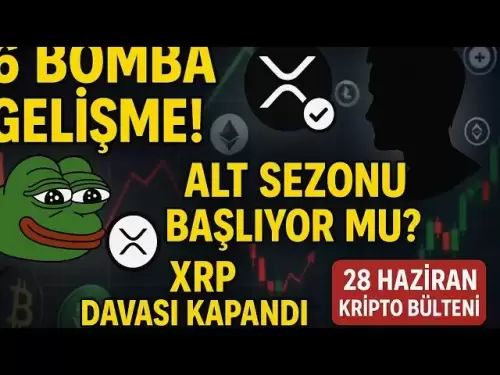-
 Bitcoin
Bitcoin $107,341.7259
0.15% -
 Ethereum
Ethereum $2,438.6204
0.70% -
 Tether USDt
Tether USDt $1.0003
-0.02% -
 XRP
XRP $2.1866
1.94% -
 BNB
BNB $649.0952
0.36% -
 Solana
Solana $150.9602
5.63% -
 USDC
USDC $0.9999
0.00% -
 TRON
TRON $0.2742
0.40% -
 Dogecoin
Dogecoin $0.1645
1.93% -
 Cardano
Cardano $0.5669
1.18% -
 Hyperliquid
Hyperliquid $37.8286
4.19% -
 Bitcoin Cash
Bitcoin Cash $491.4669
-2.74% -
 Sui
Sui $2.8150
3.06% -
 Chainlink
Chainlink $13.4184
2.91% -
 UNUS SED LEO
UNUS SED LEO $9.0809
0.27% -
 Avalanche
Avalanche $18.0295
2.60% -
 Stellar
Stellar $0.2396
1.19% -
 Toncoin
Toncoin $2.8587
0.13% -
 Shiba Inu
Shiba Inu $0.0...01160
2.59% -
 Litecoin
Litecoin $86.4192
1.45% -
 Hedera
Hedera $0.1486
1.19% -
 Monero
Monero $308.4324
0.87% -
 Polkadot
Polkadot $3.4202
1.43% -
 Bitget Token
Bitget Token $4.6436
-0.34% -
 Dai
Dai $0.9998
-0.02% -
 Ethena USDe
Ethena USDe $1.0002
0.00% -
 Uniswap
Uniswap $7.1527
3.29% -
 Pi
Pi $0.5357
-8.45% -
 Pepe
Pepe $0.0...09588
4.61% -
 Aave
Aave $259.9759
0.81%
How are OKCoin's mining rewards distributed? Detailed explanation of mining income
OKCoin doesn't distribute mining rewards; it's an exchange, not a mining operation. Miners receive rewards directly from the blockchain network, based on the cryptocurrency's consensus mechanism (e.g., Proof-of-Work or Proof-of-Stake), and then can trade those rewards on OKCoin.
Mar 11, 2025 at 12:35 pm
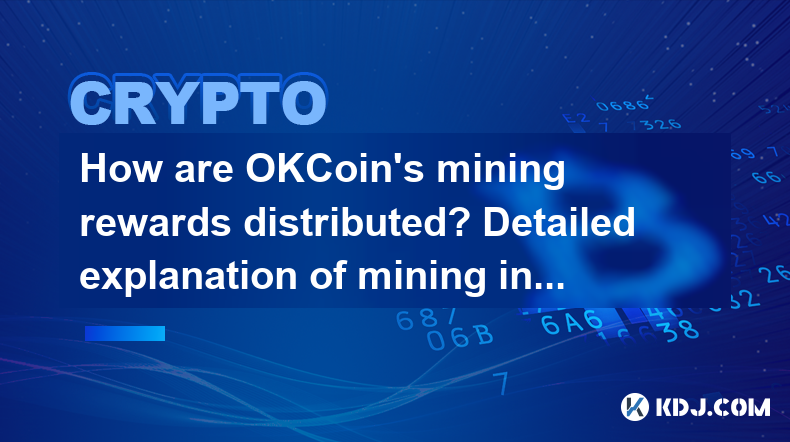
Key Points:
- OKCoin does not directly offer cryptocurrency mining services. They are a cryptocurrency exchange, not a mining operation.
- Mining rewards are distributed directly by the blockchain network, not by exchanges like OKCoin.
- The distribution method depends entirely on the specific cryptocurrency being mined (Proof-of-Work, Proof-of-Stake, etc.).
- OKCoin facilitates trading of mined cryptocurrencies, allowing miners to sell their rewards on the platform.
- Understanding the mining process and the chosen cryptocurrency's consensus mechanism is crucial for understanding reward distribution.
How are OKCoin's mining rewards distributed? Detailed explanation of mining income
OKCoin, as a prominent cryptocurrency exchange, does not participate in the direct mining of cryptocurrencies. Therefore, the question of how OKCoin distributes mining rewards is fundamentally misplaced. OKCoin's role lies in facilitating the buying, selling, and trading of cryptocurrencies, including those obtained through mining. Miners themselves receive rewards directly from the blockchain network they participate in.
The distribution of mining rewards is intricately tied to the specific cryptocurrency's consensus mechanism. The most prevalent mechanism is Proof-of-Work (PoW), famously used by Bitcoin. In PoW, miners solve complex computational problems, and the first miner to solve the problem gets to add the next block to the blockchain and receives the block reward. This reward is a pre-defined amount of the cryptocurrency itself, set within the cryptocurrency's protocol.
Another significant consensus mechanism is Proof-of-Stake (PoS). In PoS systems, miners, often called validators, are chosen based on the amount of cryptocurrency they hold. The more cryptocurrency they stake, the higher their chances of being selected to validate transactions and receive rewards. The rewards in PoS systems can be more consistent than PoW's block rewards, as they are often distributed regularly.
Understanding the difference between these mechanisms is vital. PoW systems typically involve significant energy consumption due to the computational intensity of the mining process. PoS systems, on the other hand, are generally considered more energy-efficient. The specific reward distribution details, including the reward amount, frequency, and distribution method, are all defined within the cryptocurrency's protocol.
Let's delve into the process a miner might undertake, focusing on the interaction with OKCoin. First, a miner needs to acquire the necessary mining hardware and software specific to the cryptocurrency they intend to mine. This could range from specialized ASIC miners for Bitcoin to more versatile GPUs for other cryptocurrencies.
Next, the miner joins a mining pool. Joining a pool increases the chances of solving a block and earning a reward, as the combined computational power of the pool is significantly higher than that of a single miner. The pool then distributes the rewards amongst its members based on their contribution to the pool's overall hashing power.
Once a miner earns a reward, they can then transfer those coins to their OKCoin account. This involves sending the cryptocurrency from their mining wallet to their OKCoin wallet address. After transferring the mined cryptocurrency to their OKCoin account, the miner can then trade it for other cryptocurrencies or fiat currency. OKCoin provides the marketplace for these transactions.
The actual process of receiving rewards is completely independent of OKCoin. OKCoin plays no part in determining the amount of the reward or the frequency with which it's received. The entire process is governed by the blockchain's protocol and the mining pool's rules.
Therefore, while OKCoin provides a platform for trading the fruits of mining labor, it's not directly involved in the distribution of mining rewards. The rewards are distributed by the blockchain network itself, according to the rules and mechanisms of the specific cryptocurrency being mined. This means the details of the reward distribution are inherent to the cryptocurrency, not to OKCoin.
It is also important to note that the profitability of mining is highly variable and depends on several factors. These factors include the difficulty of the mining process, the price of the cryptocurrency, the cost of electricity, and the efficiency of the mining hardware. A miner needs to carefully analyze these factors before engaging in mining activities.
The mining process can be complex, requiring technical expertise in computer hardware, software, and networking. Moreover, the regulatory landscape surrounding cryptocurrency mining varies across different jurisdictions. It is essential to understand the legal implications and regulations in your region before engaging in any cryptocurrency mining activities.
Frequently Asked Questions:
Q: Does OKCoin pay mining rewards?
A: No, OKCoin does not pay mining rewards. OKCoin is an exchange; it facilitates the buying, selling, and trading of cryptocurrencies, but it doesn't mine them. Mining rewards are distributed directly by the blockchain network.
Q: How do I receive my mining rewards if I mine on a pool?
A: Your mining pool will distribute your share of the rewards according to your contribution to the pool's hashrate. You'll receive your payment to your designated wallet address within the pool's payout schedule.
Q: Can I sell my mined cryptocurrency on OKCoin?
A: Yes, OKCoin provides a platform to trade a wide range of cryptocurrencies, including those you may have mined. You can transfer your mined cryptocurrency to your OKCoin account and then sell it on the exchange.
Q: What factors influence mining profitability?
A: Mining profitability depends on factors like the cryptocurrency's price, mining difficulty, energy costs, and the efficiency of your mining hardware. These are constantly fluctuating variables.
Q: What is the role of OKCoin in the cryptocurrency mining process?
A: OKCoin's role is limited to providing a platform for trading mined cryptocurrencies. It does not participate in the actual mining process itself.
Disclaimer:info@kdj.com
The information provided is not trading advice. kdj.com does not assume any responsibility for any investments made based on the information provided in this article. Cryptocurrencies are highly volatile and it is highly recommended that you invest with caution after thorough research!
If you believe that the content used on this website infringes your copyright, please contact us immediately (info@kdj.com) and we will delete it promptly.
- XRP, Ripple, and Bitcoin: Decoding the Latest Crypto Moves
- 2025-06-29 08:30:13
- NBA Legend Scottie Pippen's Crypto Picks: SHIB and XRP in the Spotlight
- 2025-06-29 08:50:12
- Bitcoin, US Strategy, and Cryptocurrency Regulation: Navigating the Digital Frontier
- 2025-06-29 09:10:13
- Chainlink's $17 Breakout: Bullish Momentum Fueled by Mastercard Partnership
- 2025-06-29 08:30:13
- Crypto Launches Q3 2025: Top Picks to Watch
- 2025-06-29 09:10:13
- BTC Bull Token: Riding Bitcoin's Bull Run to Crypto Glory
- 2025-06-29 09:30:11
Related knowledge

How to customize USDT TRC20 mining fees? Flexible adjustment tutorial
Jun 13,2025 at 01:42am
Understanding USDT TRC20 Mining FeesMining fees on the TRON (TRC20) network are essential for processing transactions. Unlike Bitcoin or Ethereum, where miners directly validate transactions, TRON uses a delegated proof-of-stake (DPoS) mechanism. However, users still need to pay bandwidth and energy fees, which are collectively referred to as 'mining fe...

USDT TRC20 transaction is stuck? Solution summary
Jun 14,2025 at 11:15pm
Understanding USDT TRC20 TransactionsWhen users mention that a USDT TRC20 transaction is stuck, they typically refer to a situation where the transfer of Tether (USDT) on the TRON blockchain has not been confirmed for an extended period. This issue may arise due to various reasons such as network congestion, insufficient transaction fees, or wallet-rela...

How to cancel USDT TRC20 unconfirmed transactions? Operation guide
Jun 13,2025 at 11:01pm
Understanding USDT TRC20 Unconfirmed TransactionsWhen dealing with USDT TRC20 transactions, it’s crucial to understand what an unconfirmed transaction means. An unconfirmed transaction is one that has been broadcasted to the blockchain network but hasn’t yet been included in a block. This typically occurs due to low transaction fees or network congestio...

How to check USDT TRC20 balance? Introduction to multiple query methods
Jun 21,2025 at 02:42am
Understanding USDT TRC20 and Its ImportanceUSDT (Tether) is one of the most widely used stablecoins in the cryptocurrency market. It exists on multiple blockchain networks, including TRC20, which operates on the Tron (TRX) network. Checking your USDT TRC20 balance accurately is crucial for users who hold or transact with this asset. Whether you're sendi...

What to do if USDT TRC20 transfers are congested? Speed up trading skills
Jun 13,2025 at 09:56am
Understanding USDT TRC20 Transfer CongestionWhen transferring USDT TRC20, users may occasionally experience delays or congestion. This typically occurs due to network overload on the TRON blockchain, which hosts the TRC20 version of Tether. Unlike the ERC20 variant (which runs on Ethereum), TRC20 transactions are generally faster and cheaper, but during...

The relationship between USDT TRC20 and TRON chain: technical background analysis
Jun 12,2025 at 01:28pm
What is USDT TRC20?USDT TRC20 refers to the Tether (USDT) token issued on the TRON blockchain using the TRC-20 standard. Unlike the more commonly known ERC-20 version of USDT (which runs on Ethereum), the TRC-20 variant leverages the TRON network's infrastructure for faster and cheaper transactions. The emergence of this version came as part of Tether’s...

How to customize USDT TRC20 mining fees? Flexible adjustment tutorial
Jun 13,2025 at 01:42am
Understanding USDT TRC20 Mining FeesMining fees on the TRON (TRC20) network are essential for processing transactions. Unlike Bitcoin or Ethereum, where miners directly validate transactions, TRON uses a delegated proof-of-stake (DPoS) mechanism. However, users still need to pay bandwidth and energy fees, which are collectively referred to as 'mining fe...

USDT TRC20 transaction is stuck? Solution summary
Jun 14,2025 at 11:15pm
Understanding USDT TRC20 TransactionsWhen users mention that a USDT TRC20 transaction is stuck, they typically refer to a situation where the transfer of Tether (USDT) on the TRON blockchain has not been confirmed for an extended period. This issue may arise due to various reasons such as network congestion, insufficient transaction fees, or wallet-rela...

How to cancel USDT TRC20 unconfirmed transactions? Operation guide
Jun 13,2025 at 11:01pm
Understanding USDT TRC20 Unconfirmed TransactionsWhen dealing with USDT TRC20 transactions, it’s crucial to understand what an unconfirmed transaction means. An unconfirmed transaction is one that has been broadcasted to the blockchain network but hasn’t yet been included in a block. This typically occurs due to low transaction fees or network congestio...

How to check USDT TRC20 balance? Introduction to multiple query methods
Jun 21,2025 at 02:42am
Understanding USDT TRC20 and Its ImportanceUSDT (Tether) is one of the most widely used stablecoins in the cryptocurrency market. It exists on multiple blockchain networks, including TRC20, which operates on the Tron (TRX) network. Checking your USDT TRC20 balance accurately is crucial for users who hold or transact with this asset. Whether you're sendi...

What to do if USDT TRC20 transfers are congested? Speed up trading skills
Jun 13,2025 at 09:56am
Understanding USDT TRC20 Transfer CongestionWhen transferring USDT TRC20, users may occasionally experience delays or congestion. This typically occurs due to network overload on the TRON blockchain, which hosts the TRC20 version of Tether. Unlike the ERC20 variant (which runs on Ethereum), TRC20 transactions are generally faster and cheaper, but during...

The relationship between USDT TRC20 and TRON chain: technical background analysis
Jun 12,2025 at 01:28pm
What is USDT TRC20?USDT TRC20 refers to the Tether (USDT) token issued on the TRON blockchain using the TRC-20 standard. Unlike the more commonly known ERC-20 version of USDT (which runs on Ethereum), the TRC-20 variant leverages the TRON network's infrastructure for faster and cheaper transactions. The emergence of this version came as part of Tether’s...
See all articles





















